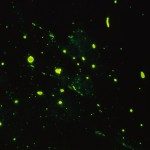Lien vers Pubmed [PMID] – 11806974
Blood 2002 Feb;99(3):754-8
Given that the FcgammaRIIIa receptor 158V allotype displays a higher affinity for human immunoglobulin G1 and increased antibody-dependent cellular cytotoxicity, the aim of this study was to determine the influence of that FCGR3A polymorphism on the therapeutic response to rituximab, an anti-CD20 humanized immunoglobulin G1 increasingly used in the treatment of non-Hodgkin lymphomas. The FCGR3A-158V/F genotype was determined in 49 patients having received rituximab for a previously untreated follicular non-Hodgkin lymphoma. The clinical response and the disappearance of the BCL2-JH gene rearrangement in both peripheral blood and bone marrow were evaluated at 2 months (M2) and at 1 year (M12). The study population consisted of 20% FCGR3A-158V homozygous patients, 35% FCGR3A-158F homozygous patients, and 45% heterozygous patients (FCGR3A-158F carriers). The objective response rates at M2 and M12 were 100% and 90%, respectively, in FCGR3A-158V homozygous patients compared with 67% (P =.03) and 51% (P =.03), respectively, in FCGR3A-158F carriers. A disappearance of the BCL2-JH gene rearrangement in both peripheral blood and marrow was observed at M12 in 5 of 6 of homozygous FCGR3A-158V patients compared with 5 of 17 of FCGR3A-158F carriers (P =.03). The homozygous FCGR3A-158V genotype was confirmed to be the single parameter associated with clinical and molecular responses by multivariate analysis. This study showed an association between the FCGR3A genotype and clinical and molecular responses to rituximab. This finding will certainly give rise to new pharmacogenetic approaches to the management of patients with non-Hodgkin lymphomas.
